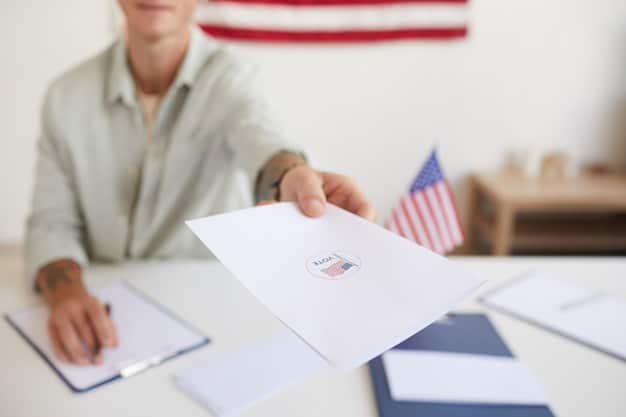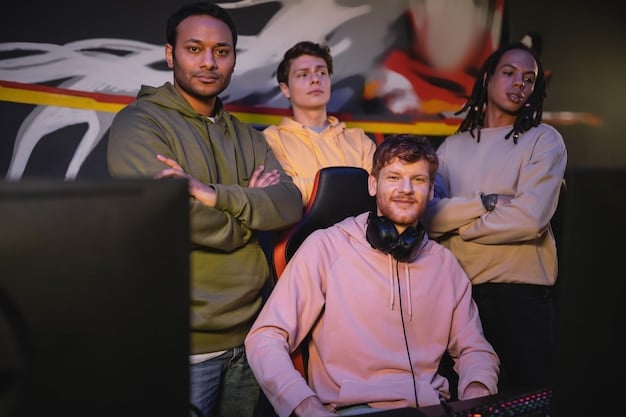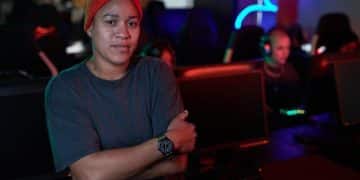Breaking: US Visa Regulations Impacting International Esports Players – January 2025 Update

Breaking: New Visa Regulations Impacting International Esports Players in the US (Updated January 2025) – Significant changes in US visa policies are set to affect international esports athletes, potentially reshaping team compositions and competitive strategies as of January 2025.
The landscape of professional esports in the United States is on the cusp of significant change. Breaking: New Visa Regulations Impacting International Esports Players in the US – Updated January 2025, have surfaced, raising concerns and prompting discussions within the industry.
Understanding the New US Visa Regulations for Esports Players
The United States has long been a hub for esports, attracting talent from around the globe. However, recent changes to visa regulations are poised to impact how international players can compete and reside in the US. These regulations aim to clarify and potentially restrict the types of visas available to professional gamers.
These updates are causing widespread discussion among teams, players, and legal experts within the esports community. Of particular concern is understanding which visa categories are now applicable and what criteria international players must meet to qualify.
Key Changes to P-1 and O-1 Visas
Two visa categories frequently used by esports professionals are the P-1 (Internationally Recognized Athlete) and the O-1 (Individuals with Extraordinary Ability or Achievement). The new regulations seek to refine the definitions and requirements for these visas in the context of esports.
Understanding these distinctions is critical for teams and players. It will determine how they plan team rosters and manage international talent acquisition moving forward.
- Stricter requirements for demonstrating international recognition: The definition of international recognition for P-1 visas may be tightened.
- Expanded criteria for “extraordinary ability”: O-1 visas may require more extensive evidence of consistent top-tier performance.
- Increased scrutiny of esports organizations: Regulations could examine the legitimacy and structure of esports teams to ensure they meet visa requirements.

In summary, the changes target the criteria used to evaluate the eligibility of esports players and organizations for specific US visas. These changes will have a knock-on affect on the esports ecosystem in the US.
How the Visa Changes Affect Esports Teams and Organizations
Esports teams and organizations are now facing the daunting task of adapting to these updated visa regulations. The new rules have implications for everything from team recruitment to long-term strategic planning.
Many teams have already begun consulting with immigration lawyers to assess their current rosters and future recruitment strategies effectively. The new requirements also affect how organizations structure contracts and support international players’ legal needs.
Navigating Recruitment and Contract Strategies
The updated visa requirements are causing teams to rethink their recruitment strategies. They may need to prioritize players who already hold US citizenship or green cards to avoid the complexities of the visa application process.
Legal support and thorough documentation will become critical for obtaining visas; therefore, expect to see those costs passed on in some form from the organizations to players.
- More emphasis on local talent: Teams may increase investment in scouting and developing domestic players to reduce reliance on international talent.
- Enhanced legal support for visa applications: Organizations will likely expand their legal departments to manage the increasing number of visa applications and compliance requirements.
- Contractual clauses addressing visa issues: Contracts may include provisions that address visa-related delays or denials, protecting both the team and the player.
Overall, recruitment strategies must become more deliberate and comprehensive in their approach, with compliance playing a central role. These regulation updates will alter the ecosystem of esports in the US.
Impact on International Esports Players
The visa changes will profoundly affect international esports players. They will need to adapt to stricter requirements and increased competition for limited visa slots. Moreover, the new regulations may force some players to reconsider their career paths and strategies.
Players must gather more extensive documentation of their achievements and demonstrate consistent top-tier performance. They may also need to improve their understanding of US immigration law and seek professional legal advice. Individual players should seek advice independently of teams.
Documenting Achievements and Seeking Legal Advice
Under the updated regulations, players will need a robust portfolio of evidence to support their visa applications. This portfolio might include records of tournament wins, individual performance statistics, and endorsements from industry experts.
Seeking expert legal advice will give individual players the best chance to achieve and maintain their residency in the US as professional esports competitors.
- Maintaining detailed performance records: Players should keep meticulous records of their tournament results, individual statistics, and any recognition they receive.
- Obtaining endorsements from industry experts: Letters of support from coaches, team managers, and other prominent figures in the esports community can strengthen a visa application.
- Engaging with immigration lawyers: Consulting with experienced immigration lawyers is essential for understanding the complexities of US visa law.
To conclude, international players will face more rigorous requirements and increased competition for US visas. Proper planning, documentation, and professional advice are more important than ever to successfully navigate these challenges and continue their careers in the United States.
Potential Long-Term Consequences for the US Esports Scene
The long-term consequences of these visa changes could reshape the US esports landscape. Depending on how the regulations are enforced, the changes could affect the competitiveness of US teams, the diversity of the esports talent pool, and the overall attractiveness of the US as a destination for professional gamers.
Teams may struggle to maintain their competitive edge if they cannot recruit top international players. It may be possible to see a decline in sponsorship when the US esports scene weakens.
Effects on Competitiveness and Diversity
If visa restrictions limit the inflow of international talent, US teams might lose their competitive edge against teams from other regions with more lenient immigration policies. Diversity within US esports could also suffer, as international players bring unique perspectives and play styles.
Changes to competitiveness and talent diversity also stand to impact the viewership and profitability of the US esports scene overall.

- Decreased competitiveness of US teams: Restricting international talent could weaken US teams on the global stage.
- Reduced diversity in esports rosters: A more homogenous talent pool could lead to less innovation and creativity in gameplay.
- Shifting of esports investment: If the US becomes less attractive to international players, investment may shift to other regions with more favorable visa policies.
In short, the visa changes have the potential to impact competitiveness, diversity, and the overall economic viability of the US esports scene. Monitoring these long-term effects will be imperative for stakeholders as the updated regulations are implemented.
Strategies for Adapting to the New Visa Landscape
Navigating the updated visa regulations requires a proactive and strategic approach. Teams, players, and organizations must adapt new methods to minimize disruptions and leverage new opportunities.
These strategies involve enhancing internal recruitment, pursuing alternative visa options, and working closely with legal professionals.
Recruitment, Alternative Visas, and Legal Collaboration
Teams may prioritize local talent development and explore alternative visa options, such as the EB-1 visa for individuals with extraordinary ability. Collaborating closely with immigration lawyers will also be critical for ensuring compliance and navigating the complexities of the visa process.
A multi-pronged approach that combines strategic planning, legal expertise, and proactive communication will provide the greatest chance of being successful.
- Investing in local talent development programs: Teams can groom domestic players to reduce reliance on international recruitment.
- Exploring alternative visa options: Different visa categories may offer more flexibility for esports professionals.
- Fostering collaboration with legal experts: Regular consultations with immigration lawyers are essential for staying informed and compliant.
In conclusion, organizations that adopt these strategies will be better positioned to navigate the new visa landscape, minimize potential disruptions, and sustain their competitive advantage in the ever-evolving world of esports.
Future Outlook: What to Expect in Esports Visa Regulations
Looking ahead, it is safe to assume that esports visa regulations will continue to evolve, reflecting the dynamic nature of the industry and broader immigration trends. Stakeholders must remain informed, adaptable, and proactive to navigate upcoming changes.
Monitoring policy updates and staying attuned to geopolitical fluctuations are crucial next steps.
Policy Monitoring and Proactive Engagement
Teams, players, and organizations should closely monitor any policy updates from government agencies. Engaging with industry associations and legal experts can provide insights into potential regulatory shifts. Proactive engagement and dialogue with policymakers will help shape future visa regulations that support a thriving US esports scene.
With those measures in place, the US esports ecosystem can anticipate upcoming challenges.
- Staying informed about policy changes: Regular monitoring of government publications and legal updates is essential.
- Engaging with industry associations: Industry groups can advocate for policies that support esports growth and international talent mobility.
- Fostering dialogue with policymakers: Open communication with government officials can help shape future regulations.
Based on all available information, it is clear that the esports industry must embrace a proactive and vigilant approach to navigate the future of US visa regulations. Staying informed, collaborating with experts, and engaging with policymakers will be critical for sustaining the growth and competitiveness of US esports in the years to come.
| Key Point | Brief Description |
|---|---|
| 📜 Visa Regulation Changes | Updated requirements for P-1 and O-1 visas impacting international esports players. |
| 🏢 Impact on Teams | Teams must adapt recruitment, contracts, and legal support to comply. |
| 🌍 Player Challenges | Players need robust documentation and legal advice for visa applications. |
| 🔮 Future Outlook | Continued policy evolution requires vigilance and proactive engagement. |
FAQ Section
▼
The primary changes involve stricter requirements for P-1 (Internationally Recognized Athlete) and O-1 (Individuals with Extraordinary Ability) visas. More extensive evidence of achievements and international recognition is now required.
▼
Esports teams will need to rethink recruitment strategies, potentially focusing more on domestic talent. They will also need to enhance legal support for international players and include visa-related clauses in contracts.
▼
Players should meticulously document their achievements, seek endorsements from industry experts, and consult with experienced immigration lawyers to understand the specific requirements and strengthen their visa applications.
▼
Long-term consequences could include decreased competitiveness of US teams, reduced diversity in esports rosters, and a potential shift of esports investment to other regions with more favorable visa policies.
▼
Stakeholders should invest in local talent development programs, explore alternative visa options, and foster close collaboration with legal experts to ensure compliance and strategic adaptation to the changing regulations.
Conclusion
In summary, the updated US visa regulations present significant challenges and opportunities for the esports sector. Teams, players, and organizations that proactively adapt and remain informed will be best positioned to thrive in this ever-evolving landscape. The keys to success include strategic recruitment, thorough legal preparation, and a commitment to engaging with policy developments as they unfold.





